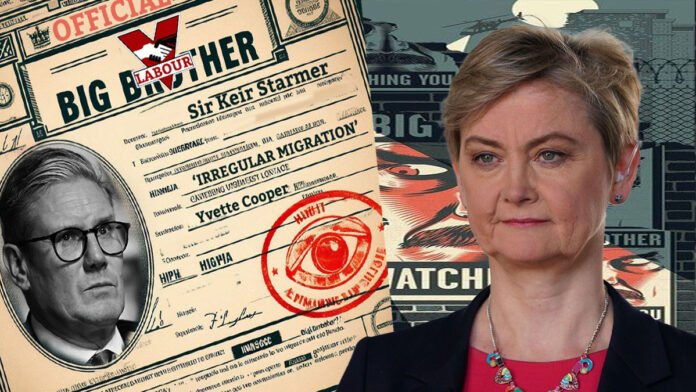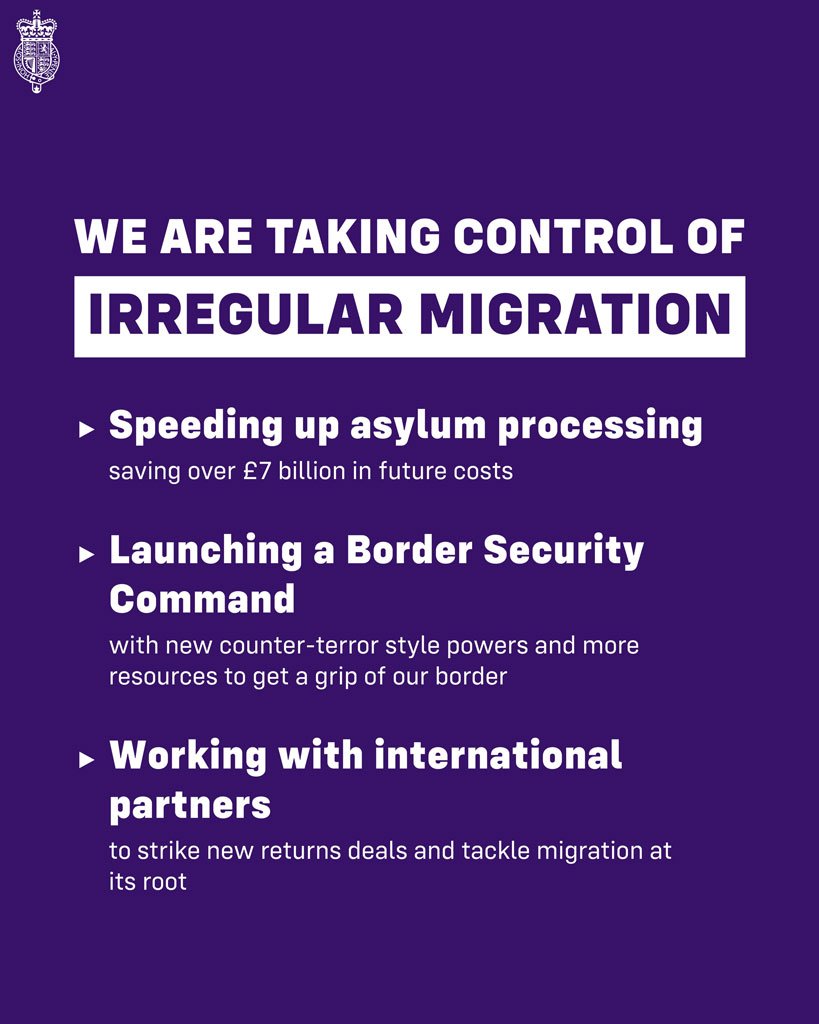
Newspeak in Action Language Control: From ‘Illegal’ to ‘Irregular’ Migration
The linguistic acrobatics of power never cease to astound. In a move that would make Big Brother himself nod with approval, Sir Keir Starmer’s Labour government has decided to rebrand ‘illegal migration’ as ‘irregular migration‘. This isn’t just a harmless semantic shuffle; it’s a calculated attempt to sanitise a contentious issue through linguistic sleight of hand. Welcome, dear readers, to the brave new world of political Newspeak, where the very foundations of our discourse are being eroded before our eyes.
Let us not delude ourselves: this verbal conjuring trick isn’t merely about prettifying immigration statistics. It’s a dangerous precedent that threatens to unravel the very fabric of our political discourse. Consider, if you will, the implications of this seemingly innocuous change. Today, we’re asked to swallow the notion that there’s no such thing as ‘illegal migration’ – only ‘irregular’ movement. Tomorrow, what other inconvenient truths will be whitewashed from our lexicon?
I’m sure there are many among this new Liberal elite that welcome ‘Newspeak’ along with the totalitarianism of Starmer’s New Labour, those that embrace thoughtcrime, censorship and cancel culture. Those that cheer the book burning of the gaping memory hole where every inconvenience is thrown and forgotten.
Imagine, if you dare, attempting to discuss the recent International Court of Justice verdict stating that Israel is carrying out an illegal occupation of Gaza and the West Bank. In this sanitised speech universe, we might find ourselves grappling with an “irregular presence” instead. The gravity of the situation, the weight of international law – all neatly scrubbed away with a linguistic eraser.
And why stop there? If it works for Israel, perhaps Putin will soon argue that the war in Ukraine is merely an “irregular intrusion”. After all, if we’re redefining illegality, why not redefine invasion as well? Oh, that’s right, it’s a rules-based order where the rules for one aren’t necessarily the same rules for the other, after all, we need our forever wars, don’t we?
Try to discuss the plight of climate refugees fleeing uninhabitable lands, we might find ourselves grappling with “irregular climate avoiders” instead. The urgency of the climate crisis, the weight of our moral obligation – gone! Instead, we are aiming our kicks at those pesky avoiders.
And what of the plight of refugees fleeing the horrors of war-torn nations? We might find ourselves grappling with “conflict escapees” instead. The brutal reality of warfare, the weight of our international obligations under the Geneva Convention – all neatly packed away.
The harrowing journeys of families fleeing bombs and bullets reduced to mere “irregular relocators”. It’s a linguistic sleight of hand that threatens to erase the very humanity of those seeking safety from the ravages of war.
Soon thieves won’t be breaking the law; they’ll be engaging in “irregular property redistribution”. Perhaps when the food bank queues get too long, they’ll be described as “irregular nutrition centres”. After all, if we’re redefining human movement, why not redefine poverty as well? The homeless won’t be victims of a broken system; they’ll be engaging in “irregular domicile practices”. It’s a slippery slope that leads straight to Orwell’s Ministry of Truth, greased by the oily words of politicians.
This Orwellian newspeak isn’t just the domain of totalitarian regimes anymore. It’s creeping into our democracy, dressed up as progressive policy. But make no mistake, it’s just as dangerous. It’s a calculated attempt to restrict our ability to think critically about complex issues. They’re changing the very meaning of words to muddy the waters of public debate, engaging in verbal gymnastics designed to make it impossible to argue against their policies more so to hold them accountable. After all, how can you oppose something that, in the newspeak dictionary, doesn’t even exist?
Splitting hairs won’t solve the problems
Rob McNeil, deputy director of Oxford University’s Migration Observatory, said neither the use of “illegal migration” nor “irregular migration” were wrong but carried different emphases in the approach to the issue.
They appear in some ways to reflect the different approaches by the two parties. The Conservatives’ Illegal Migration Act was designed to bar migrants from claiming asylum in the UK and instead deport them to Rwanda to do so there.
Labour is proposing that migrants who were earmarked for Rwanda will instead be brought back into the asylum system for their claims to be processed in the UK. Only those refused asylum will face removal.
Mr McNeil said: “It is not illegal to claim asylum under international law. Entering the UK without permission is illegal but it is also tolerated under international law if people are recognised as refugees.
“The difference between illegal and irregular is semantic. It is not legally correct or incorrect to describe people with either term. It is essentially a moral or political judgement about the loading of the term.
“You might choose the word illegal if you want people to be angry with the migrants in question or provoke a strong response. Alternatively you might prefer the word irregular if you are saying you need to have a moderate response and work out whether people have a legitimate claim for asylum.”
However, kinder words don’t change facts. During the Biden administration, “kids in cages” became “family separation.” It’s still a cruel policy, merely repackaged with a friendlier face, one might say more palatable to the press and easier on public ears.

“Political language is designed to make lies sound truthful and murder respectable, and to give an appearance of solidity to pure wind. ”
― George Orwell
As George Orwell warned us, “The purpose of Newspeak was not only to provide a medium of expression for the world-view and mental habits proper to the devotees of INGSOC, but to make all other modes of thought impossible.”
By narrowing the range of language, one narrows the range of thought. It’s not just about changing words; it’s about changing minds – and ultimately, about control.
Labour, of course, denies any such Orwellian intent. “Irregular migration has always been used by the Home Office,” they claim, hiding behind the skirts of bureaucratic jargon. But let’s not be naive. This is not mere administrative tidying; it’s a calculated attempt to reshape the narrative, chucking words down the memory hole and reallocating meaning to suit their neoliberal agenda.
The insidious nature of this linguistic shift cannot be overstated. By removing “illegal” from the lexicon, they’re attempting to remove the concept of illegality from the migration debate altogether. It’s a masterclass in thought control that would make even the most ardent totalitarian nod in approval.
And let us not forget the broader implications. If we accept this change, we’re tacitly agreeing that language is malleable, that truth is flexible. We’re opening the door to a world where facts are whatever those in power say they are. “War is peace, freedom is slavery, ignorance is strength” – and now, apparently, “illegal is irregular”.
This Orwellian newspeak isn’t just the domain of totalitarian regimes anymore. It’s creeping into our democracy, dressed up as progressive policy. But make no mistake, it’s just as dangerous. It’s a calculated attempt to restrict our ability to think critically about complex issues, to speak truth to power, to call out wrongdoing.
So, the next time you hear a politician or pundit use the term “irregular migration”, remember what’s really at stake. It’s not just about migration. It’s about our ability to maintain the integrity of our language and, by extension, our thoughts.
As we watch this Orwellian drama unfold, you can’t help but wonder: in this brave new world of sanitised speech, will we even have the words left to protest? Or will we find ourselves trapped in a linguistic prison of our own making, unable to articulate the very concepts we need to challenge the status quo?
Remember, in the world of Newspeak, “War is peace. Freedom is slavery. Ignorance is strength.” And now, apparently, ‘illegal’ is ‘irregular’. But we mustn’t let them rewrite our reality. For if we lose control of our words, we lose control of our thoughts. And in that silent, sanitised world, the powerful will reign unchallenged, while the rest of us are left without even the vocabulary to express our discontent.
Migration is not the issue, the use of words is and will be…
Support Independent Journalism Today
Our unwavering dedication is to provide you with unbiased news, diverse perspectives, and insightful opinions. We're on a mission to ensure that those in positions of power are held accountable for their actions, but we can't do it alone. Labour Heartlands is primarily funded by me, Paul Knaggs, and by the generous contributions of readers like you. Your donations keep us going and help us uphold the principles of independent journalism. Join us in our quest for truth, transparency, and accountability – donate today and be a part of our mission!
Like everyone else, we're facing challenges, and we need your help to stay online and continue providing crucial journalism. Every contribution, no matter how small, goes a long way in helping us thrive. By becoming one of our donors, you become a vital part of our mission to uncover the truth and uphold the values of democracy.
While we maintain our independence from political affiliations, we stand united against corruption, injustice, and the erosion of free speech, truth, and democracy. We believe in the power of accurate information in a democracy, and we consider facts non-negotiable.
Your support, no matter the amount, can make a significant impact. Together, we can make a difference and continue our journey toward a more informed and just society.
Thank you for supporting Labour Heartlands








